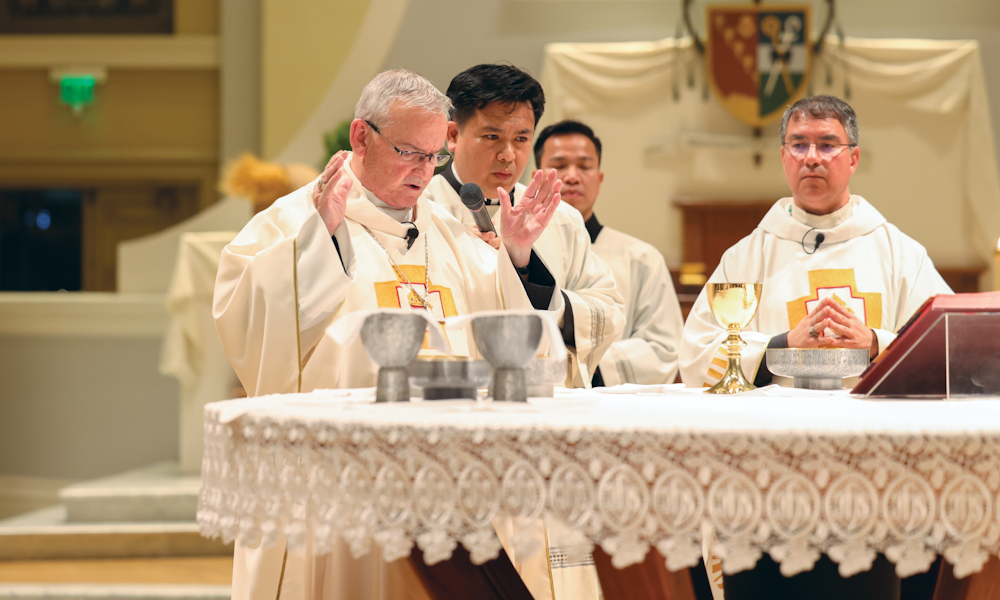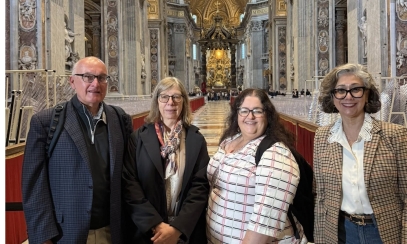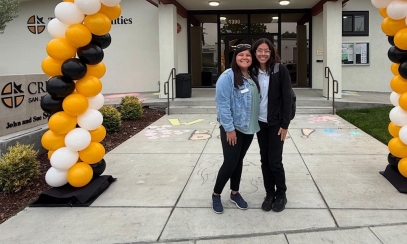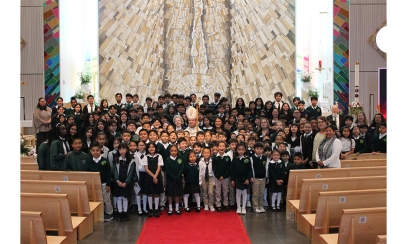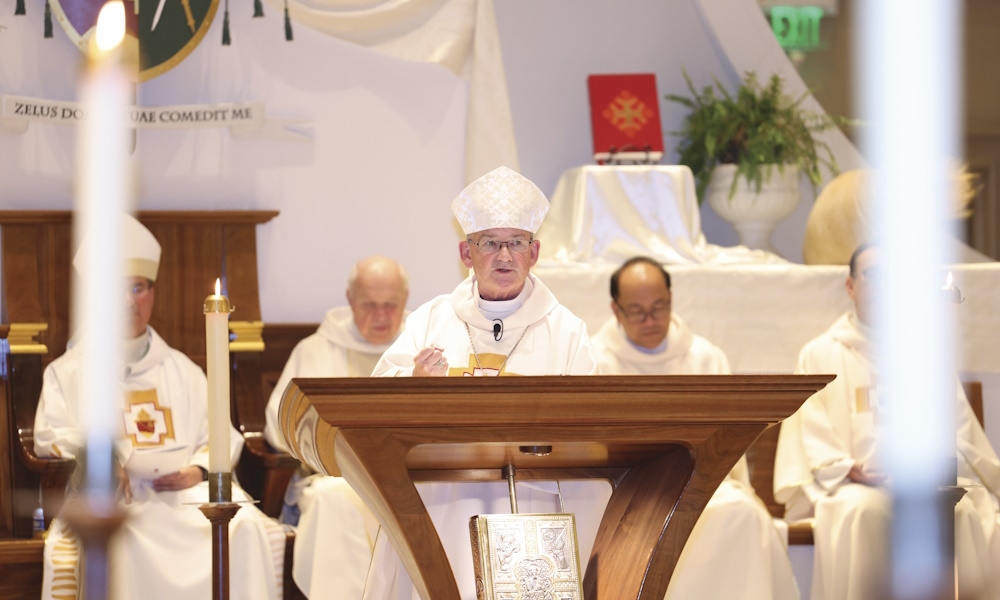
The Church Becomes Its True Self by Encountering Christ in Liturgy
Interview with Abbot Jeremy Driscoll, O.S.B., Dicastery for Divine Worship
Interview with Abbot Jeremy Driscoll, O.S.B., Dicastery for Divine Worship
Abbot Jeremy Driscoll, Benedictine monk, priest, and now head of Mount Angel Abbey, has spent a lifetime instructing on the topic of the sacred liturgy at Mount Angel Seminary in Oregon. To describe the good Abbott as a distinguished scholar is an understatement. In addition to forming seminarians and missionary disciples in retreat and academic settings, as well as an international circuit of speaking engagements, he has also authored several historical and theological books, such as What Happens at Mass and Awesome Glory: Resurrection in Scripture, Liturgy, and Theology.
Our interview focused on community formation and preparation for the Mass. As a consultant for the Vatican Dicastery for Divine Worship, he was invited by Bishop Cantú to give a talk on the Mass to our diocesan priests. The Abbot had presented on the same topic a month earlier at a plenary meeting for the Dicastery in Rome. The conversation between Bishop Oscar Cantú, Abbot Jeremy Driscoll, and the editor occurred in Bishop Cantú’s office.
Abbot Jeremy Driscoll, Benedictine monk, priest, and now head of Mount Angel Abbey, has spent a lifetime instructing on the topic of the sacred liturgy at Mount Angel Seminary in Oregon. To describe the good Abbott as a distinguished scholar is an understatement. In addition to forming seminarians and missionary disciples in retreat and academic settings, as well as an international circuit of speaking engagements, he has also authored several historical and theological books, such as What Happens at Mass and Awesome Glory: Resurrection in Scripture, Liturgy, and Theology.
Our interview focused on community formation and preparation for the Mass. As a consultant for the Vatican Dicastery for Divine Worship, he was invited by Bishop Cantú to give a talk on the Mass to our diocesan priests. The Abbot had presented on the same topic a month earlier at a plenary meeting for the Dicastery in Rome. The conversation between Bishop Oscar Cantú, Abbot Jeremy Driscoll, and the editor occurred in Bishop Cantú’s office.
Editor: Abbott Jeremy, as a liturgist working with a Vatican commission, what direction would you say is the Holy Father leading us liturgically?
Abbot Jeremy: The Holy Father, in his beautiful apostolic letter on authentic liturgy, Desiderio Desideravi, speaks on the need to form the community to be prepared to receive the Lord in the liturgy. People think the Holy Mass is about the community doing the liturgy. The community does the liturgy in a sense, but really, it is Christ who enacts the liturgy.1 Christ forms the community through the liturgy, so the community’s best efforts are spent understanding that. Depending on audience formation for the liturgy, they will become formed by the liturgy.
Pope Francis remarks in the document, and I am paraphrasing, “See how anxious Jesus is to give himself to us in the Eucharist? His body was given from the cross, and his blood was given from the cross. For our life and salvation?” There is communion in Christ’s sacrifice: the Church comes into being in its encounter with Christ. This is not simply a one-on-one encounter of each of us with Jesus but of all of us together, being formed into one body, not by our individual efforts but by our collective readiness to receive.
Bishop Cantú: Our diocese is in the process of spiritual renewal. We underwent a synodal process that identified six priorities for us to focus on for the next six years until our 50th anniversary in 2031. It will also be the 500th anniversary of the apparition of Our Lady of Guadalupe to St. Juan Diego. Worship has been identified as a priority. What would you say to our diocese about growing our understanding of what we do at Holy Mass?
Abbot Jeremy: I would say to your diocese, do not just focus on the liturgy. Focus on everything coming from out of the liturgy and returning to the liturgy. In your pastoral plan, in some sense, you need to find how, in the very celebration of the Eucharist, one is deepening in understanding their encounter with Jesus, with the Trinity. You must work out how to prepare the faithful to do this here in San José, California. Everyone should be asking, personally and communally, “Who do we become when we encounter Christ Sunday after Sunday in this way?” The more deeply one enters that mystery, the more they pour themselves out in love.
Editor: What is the vision of liturgy taught at Mount Angel Seminary?
Abbot Jeremy: We are doing important work at Mount Angel. For the last 30 years, we have created a vision that begins with the liturgy and finishes with the liturgy. That does not just mean studying more liturgy but understanding how everything is rooted in an encounter with Christ. We can live holy lives because we are fed with the body and blood of Christ. We are formed by an encounter with Christ in the liturgy.
Editor: Speaking of liturgy and seminary formation, Abbot, as a mother, I have often thought that one practical seminary class would be one in which a seminarian spends a semester helping a large family get ready for Mass in the morning. It would be interesting to see how liturgical formation would grow from that experience.
Bishop, who has six siblings, seemed to resonate with this practical suggestion.
Bishop Cantú: I remember one Sunday morning, I woke up, and it was so quiet in the house. They had gone out to Mass, and I was alone. My mom’s explanation to my tearful self later was that they had just not wanted to wake me up because I was ‘sleeping so peacefully.’
Everyone, including Bishop, chuckled at this childhood story.
Editor: Abbot, can you remark on how forms of popular piety can help ready us for the liturgy?
Abbot Jeremy: Well, being monks, we do not have much popular piety in the monastery, but I am sure those things are good. For myself, I pray the Liturgy of the Hours. There is also immense value in praying before the Blessed Sacrament. If people celebrate the Eucharist well, they will encounter Christ, and holy Mass will become this huge event in their lives. That is the desire for liturgy I am talking about. I am channeling Pope Francis, I think.
Bishop Cantú: And this is what the priests will learn about this afternoon? I look forward to it.
Abbot Jeremy: This afternoon, I will talk to your priests about delicacy in the language of the Eucharist. You cannot grasp the meaning of ‘memorial’ without the resurrection. With Jesus, memory is stronger because when we remember his death, he is truly there, risen, saying, “I want you alive, and I want you to enjoy this meal.” That is deep human language, and Jesus could speak that language using a special meal, not just a ‘table.’ It is worth distinguishing the Last Supper from table fellowship on the street because we get confused and sometimes say that everybody should have a community meal because Jesus ate with everyone. But the Eucharist is a different meal, a meal by which Jesus communicates that he wants us to be alive. The difference here is that he died so we can live by the meal.
Editor: Abbott, what is the link between authentic friendship with the Lord and authenticity in the liturgy?
Abbot Jeremy: The link is this: authentic friendship with the Lord is authenticity in the liturgy. Let us consider the following: What was the purpose of the reform of the liturgy? Well, one of its key elements was that the whole assembly would understand itself as an actor — not a bystander — in the liturgy. Pope Francis mentions in his letter that it is not just the priest who is acting in the liturgy. It is an ordered community where the entire assembly acts together with Christ as head. This is where his predecessors and the Second Vatican Council have been leading. However, Pope Francis also acknowledges that this has not happened even though we have been doing it for 60 years. The Pope challenges priests by saying, “You are not leading the liturgy well,” and he points out some specific ways in which that is not happening.
At the same time, the Holy Father is not just scolding. He also says, and this is paraphrased: “Does a priest understand what he is doing when he stands at the altar and celebrates? Does he feel in himself Jesus’s own burning love for the people?” The spirituality of the priest is essential. He must be authentic, intellectually formed, and rooted in sacrifice. The people need priest leaders; they will understand what is happening in liturgy if the priest himself understands it, loves it, and owns it.
Editor: Last question, Abbott, how do Catholics become our authentic selves through liturgy?
Abbot Jeremy: One of the Church’s traditional ways of understanding the Church is not as Christ but as one body with Christ. Christ is the husband, while the whole body of believers is the wife. The husband is not his wife; the wife is not the husband, and their kids are not them. However, they now are all one flesh, and the same is true of the Church. In the liturgy, we are gathered into the whole and become one flesh in Christ to become like Christ. He sacrifices, and we sacrifice; one does not end where the other begins.
God created the world this way to reveal Himself through creation and reveal Himself in Christ. Christ reveals the Father’s love and reveals us to ourselves, as I have said in several ways. It is worth remembering that the Church comes into being and becomes its authentic self by encountering. worshiping, and disposing itself to receive Christ in the liturgy.
1 Desiderio Desideravi (DD) 15. (cf. Sacrosanctum Concilium, The Constitution on Sacred Liturgy. Second Vatican Council,11,14)
Abbot Jeremy Driscoll, O.S.B., is the 12th abbot of Mount Angel Abbey in St. Benedict, Oregon. He has taught at the Colegio de Sant’ Anselmo, the Pontifical Benedictine University in Rome, and he continues to teach at Mount Angel Seminary.
Bishop Oscar Cantú is the third Bishop of the Diocese of San José. He has served on several committees of the United States Conference of Catholic Bishops (USCCB) and is also the President of the California Catholic Conference of Bishops (CCC).
Marissa Nichols is the managing editor and lead writer for The Valley Catholic, the award-winning magazine for the Catholic Diocese of San José. She attends Mass with her family at the Carmelite Monastery in Santa Clara.

